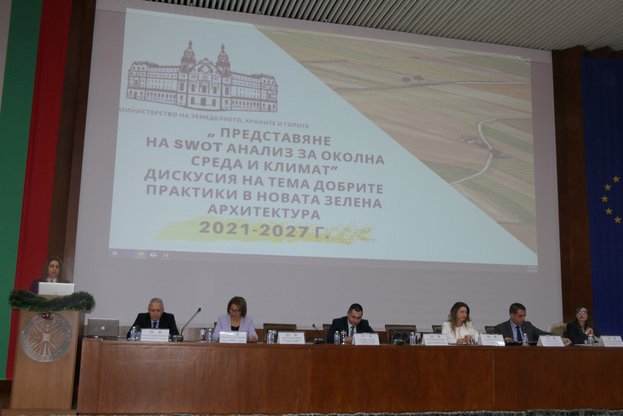
One One of of the main objectives of the CAP 2021-2027 is environmental and climate care. This was made clear during the official presentation of the Environment and Climate SWOT Analysis prepared by the Agricultural University of Plovdiv. This is the second analysis needed to prepare the Strategic Plan for the new CAP. Its presentation to the industry and stakeholders at the Agricultural University of Plovdiv was attended by the Deputy Minister of Agriculture, Food and Forestry Verginia Krasteva, the Head of the Coordination Group for drawing up the CAP Strategic Plan at MAFF Maria Hristova and Georgi Ralchev, an employee of the Permanent Representation of Bulgaria in Brussels, as well as experts and directors of Directorates of the Ministry.
Prof. Dr. Vladislav Popov, Head of the Expert Group that prepared the analysis, presented the data on the specific objectives set out in the new CAP Regulation relating to the environment and climate. These include the contribution to the mitigation and adaptation to the climate change consequences, as well as to sustainable energy, the promotion of sustainable development and the effective management of natural resources such as water, soil and air. Another objective is the protection of biodiversity, the improvement of ecosystem services and the conservation of habitats and landscapes, as well as sustainable forestry.
During the presentation, it became clear that the new green architecture is one of the main topics of debate among Member States. They should include in their strategic plans a system of conditions that impose requirements on farmers who receive direct payments - the so-called conventionality. The Member States must ensure that all agricultural land, including land which is no longer used for production purposes, is maintained in good ecological condition. The ex-ante conditionalities are set out as an integral part of the future CAP framework and compile the "green requirements" applied so far and the cross compliance system built up of standards and requirements.
Our country's commitment is to create voluntary eco-schemes for farmers, which must be fully coordinated with other interventions and be scientifically validated. They should include incentives and rewards for delivering public benefits through environmentally friendly and climate friendly agricultural practices or as compensation for the introduction of such practices. Eco-schemes and management commitments must go beyond the mandatory requirements already prescribed by the conditionality system.
Agricultural industry associations also took an active part in the event. They presented good agricultural environmental practices that are linked to more sustainable green farming for each agricultural sector.